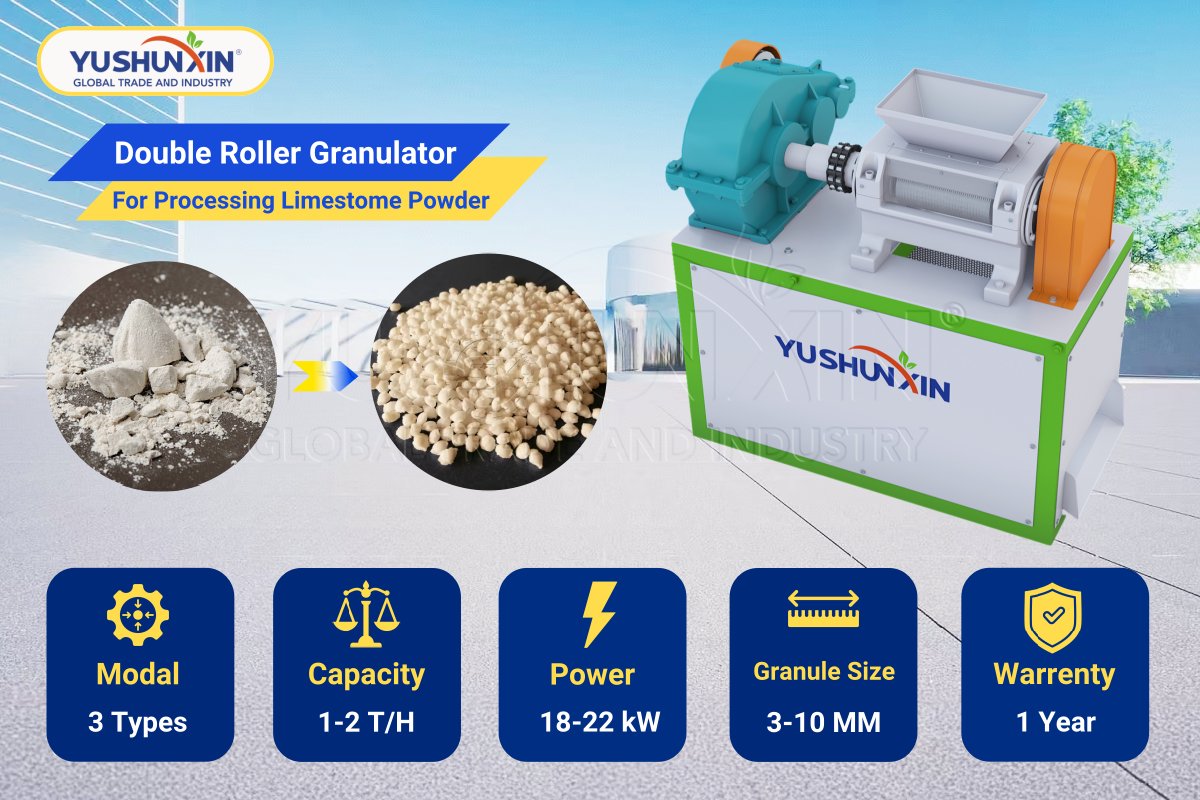In modern fertilizer engineering, extrusion granulation plays a decisive role in improving product quality and optimizing production efficiency. When industries use lime powder or limestone materials to prepare compound fertilizers, several interrelated factors determine the performance of the granulating process. The following discussion explores these influential elements from raw material selection to equipment configuration, leading to a professional understanding of lime-based fertilizer granule manufacturing.
1. What Types of Raw Materials Affect the Performance of Lime Powder Fertilizer Granulation?
The efficiency of extrusion granulation depends largely on the chemical and physical nature of raw materials. Lime powder, limestone, and lime rock with moderate fineness and balanced moisture content provide better compacting and forming properties. When used as a calcium supplement in fertilizer manufacturing, they help neutralize soil acidity, promote nutrient absorption, and enhance particle hardness. The construction material industry often prefers finely milled lime powder for consistent granule strength, while the environmental sector benefits from using lime rock granules for wastewater treatment adsorbents.
When combining lime-based materials with additional mineral sources such as phosphate rock or magnesium oxide, the granulation process achieves a more uniform mix, which directly affects extrusion pressure and granule uniformity. Therefore, the choice and proportion of each material significantly influence the energy consumption, extrusion force, and granule durability. Balanced material composition ensures that the final lime fertilizer particles maintain stable physical structure during storage and transportation.

2. How Do Machine Configurations and Granulating Techniques Improve Lime Fertilizer Production Efficiency?
In lime powder fertilizer preparation, machinery selection determines the consistency and efficiency of granulation. A loader-type feeder supplies raw materials evenly, ensuring continuous feed during production. A crane crusher refines large limestone lumps into smaller, easily mixable particles. The horizontal mixer then blends lime powder with other additives, forming a uniform base for extrusion.
The double roller extrusion granulator serves as the core of the system. This equipment compacts dry materials under high pressure, forming dense granules without the need for additional moisture or heat. Such dry granulation or compacting procedure reduces drying time and energy consumption while improving product uniformity. After extrusion, the rotary screening machine separates qualified pellets from oversized or undersized ones. Belt conveyors transfer the sorted materials to the automatic packaging scale, completing an efficient and automated fertilizer production line.
These interconnected machines maintain stable operation and precise control of particle size distribution. By adjusting roller gap, pressure, and feeding speed, operators can optimize granule density and surface smoothness. Consequently, industries processing lime powder fertilizers achieve higher mechanical strength and reduced dust generation during handling.
3. Why Do Operating Parameters and Production Environment Determine the Stability of Lime Granulation?
Stable granulating performance requires balanced operational conditions. Extrusion pressure, roller temperature, and feed rate must match the physical characteristics of lime powder. If the pressure is too low, granules may remain loose; if too high, they may crack. Controlled humidity prevents agglomeration while allowing smooth particle release from the press rollers.
Moreover, the cleanliness of the production environment influences mechanical wear and product quality. Dust accumulation around the extruder or pelletizer can cause uneven feeding and equipment abrasion. Regular maintenance of the granulation machinery ensures consistent compacting performance, extending service life and reducing downtime. For large-scale lime powder fertilizer manufacturing, automated control systems enable accurate parameter adjustment, further improving efficiency and reducing labor intensity.
4. Comprehensive Understanding and Industrial Implications
Extrusion granulation in lime powder fertilizer production represents a delicate balance between raw material properties, mechanical design, and operational management. Proper coordination among these aspects ensures high-efficiency particle formation, stable product size, and reduced environmental impact. Industries that process limestone-based fertilizers can enhance competitiveness through continuous improvement of their granulating process, adopting advanced equipment and optimized technology to achieve consistent quality.
A professional fertilizer equipment manufacturer—Yushunxin—provides integrated solutions for lime powder granulation, from raw material feeding to automatic packaging. The company’s expertise in double roller extrusion systems and supporting machinery helps industrial users build efficient, durable, and sustainable fertilizer production lines tailored to diverse material requirements and process goals. You can visit: https://www.extruder-granulator.com/product/limestone-powder-granulation-machine/